Table of Contents
ToggleMedical internships let you get real-world experience and learn important skills. You’ll learn about patient care, clinical procedures, and how to grow professionally. You’ll also make valuable connections in the healthcare field.
Interns work directly in healthcare settings, putting what they learned in school to the test. They improve their skills and understand the medical field better. This article will show you the key skills you can get from an internship. It will help you decide if this is the right step for your career.
Key Takeaways
- Hands-on experience with patients, including conducting interviews, performing physical exams, and maintaining records.
- Mastering patient care skills, such as supporting physicians, documenting findings, and collaborating with interdisciplinary teams.
- Observing and assisting in surgical procedures to gain a better understanding of various techniques.
- Developing proficiency in performing diagnostic tests like EKGs and blood draws.
- Exploring different medical specialties through rotations, enhancing clinical knowledge and decision-making.
Hands-on Experience with Patients
Medical internships give interns a chance to work directly with patients. They learn important skills like talking to patients, building trust, and understanding their needs. These skills are key for giving top-notch, personalized healthcare.
Interns get to do things like talk to patients, check their health, and explain their conditions. They also keep detailed records of patient info. This makes sure everyone in the healthcare team has the right information.
Developing Patient-Centered Skills
Working with patients helps interns see things from their point of view. They learn to listen well, ask caring questions, and explain things clearly. This builds trust and open communication with patients.
“Medical internships are invaluable in helping aspiring healthcare professionals develop the patient-facing skills necessary to provide exceptional, holistic care.”
Interns also get to do basic patient care tasks like checking vital signs and giving out medicine. This hands-on learning helps them understand what healthcare workers do every day. It prepares them for the challenges of clinical work.
Medical internships are key in making healthcare professionals who care deeply about their patients. They learn the skills, empathy, and patient focus needed to succeed in medicine.
Mastering Patient Care
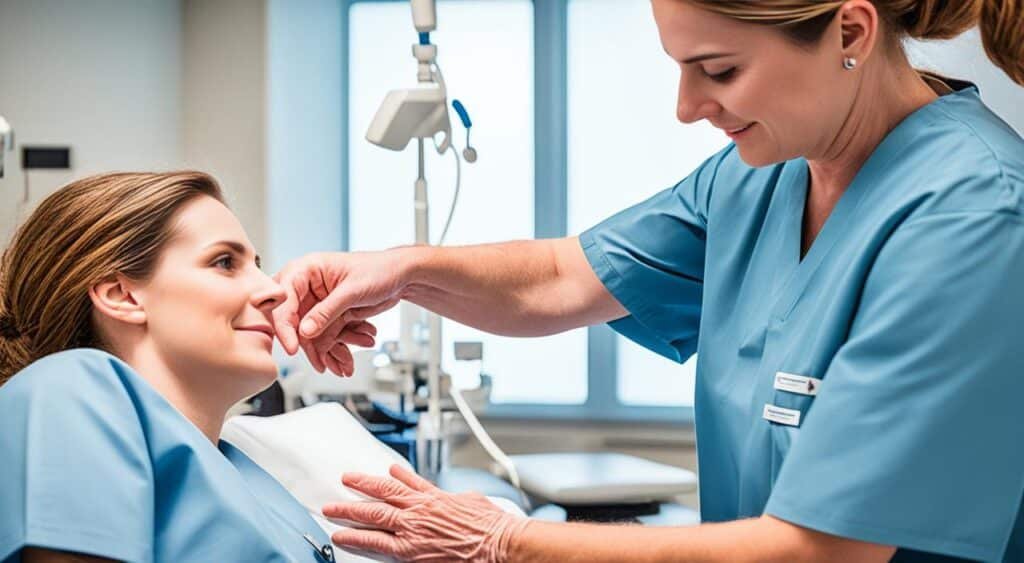
Medical internships let future healthcare pros dive deep into patient care. They work with seasoned doctors, getting real-world experience in giving full care to patients. This helps them become caring and skilled healthcare workers.
Documenting Findings and Conducting Assessments
Keeping accurate records and daily patient checks is key in medical internships. Interns learn to write down patients’ health histories, symptoms, and changes. This makes sure the healthcare team knows everything about each patient’s health and needs.
Participating in Hospital Rounds and Collaborating with Teams
Interns join hospital rounds, watching and adding to talks on how to care for patients. They work with teams like nurses, therapists, and experts. This helps make sure patients are safe and doing well.
“The patient-centered approach I learned during my medical internship has been invaluable in my career as a physician assistant. It taught me the importance of holistic care and collaborating with the entire healthcare team.”
Through these activities, medical interns get a better grasp of the healthcare system and their role in helping patients. This real-world experience readies them for careers as healthcare professionals focused on patients’ health.
Monitoring Vital Signs
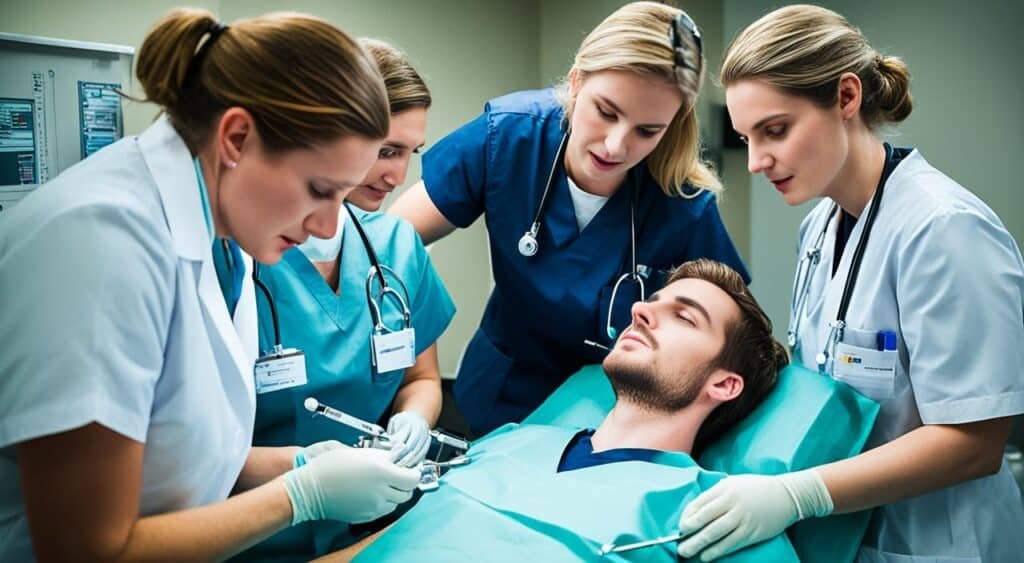
During medical internships, students get to learn by doing. They practice monitoring and recording vital signs on patients. This skill is key for their future work in giving great patient care.
Interns learn to measure and keep track of vital signs like pulse rate, temperature, blood pressure, weight, and height. This clinical exposure helps them check patients’ health and spot any problems early. It teaches them how to give top-notch emergency medicine.
Medical internships give students a chance to gain hands-on experience in real healthcare settings. By watching and recording vital signs, they learn how important it is to check patients carefully. They also learn to spot health issues early.
| Vital Sign | Normal Range | Significance |
|---|---|---|
| Body Temperature | 97.6-99.6°F (36.4-37.6°C) | Shows if the body can keep its temperature right. It can also mean infection or sickness. |
| Pulse Rate | 60-100 beats per minute | Shows how well the heart is working. It tells us about heart health. |
| Blood Pressure | Systolic: 90-120 mmHg Diastolic: 60-80 mmHg |
Checks how hard blood is pushing through the blood vessels. It can show high blood pressure or other heart problems. |
| Respiratory Rate | 12-20 breaths per minute | Tells us how well the lungs are working. It can point to breathing problems or lung issues. |
Learning to monitor vital signs is a big deal for medical interns. It gives them the skills they need for their future careers. This training helps them know how to take great care of patients, which is key for their growth.
Observing Surgical Procedures
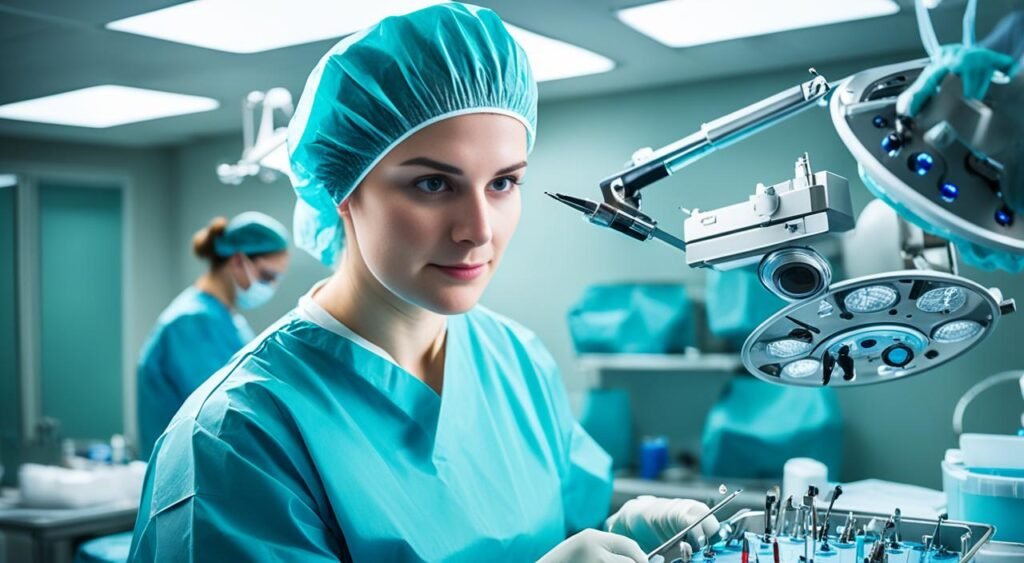
Medical internships let interns see and help with many surgical procedures. These range from simple outpatient surgeries to complex ones. This hands-on experience helps interns understand different surgical techniques and the surgical process.
Interns see medical procedures up close. This helps them understand the details of various surgeries and the important role surgeons and their teams play. This experience is key for interns to get a full view of the medical field.
Observing the Surgical Workflow
Interns get to see the whole surgical process during operations. They watch from the start, when the patient is prepared, to the end, when the patient is cared for after surgery. They learn about:
- Patient safety and how to keep things clean
- How to use special medical tools and equipment
- How the surgical team works together
- The steps of different surgical techniques
By watching procedures, interns learn how complex and precise surgery is today.
Assisting in Surgical Duties
Sometimes, interns can help with parts of surgical procedures. They do this under the watchful eyes of skilled surgeons. They might do things like:
- Get the operating room ready and make sure it’s clean
- Give the surgeon tools during the surgery
- Watch the patient’s vital signs and share important info with the team
- Help close the surgery site, like stitching or putting on dressings
By helping with these surgical procedures, interns get real-world experience. They learn more about how surgeries work.
Being able to watch and help with surgical procedures is a big part of many medical internships. It gives interns a special chance to learn and grow in their medical skills.
Rotating Through Medical Specialties
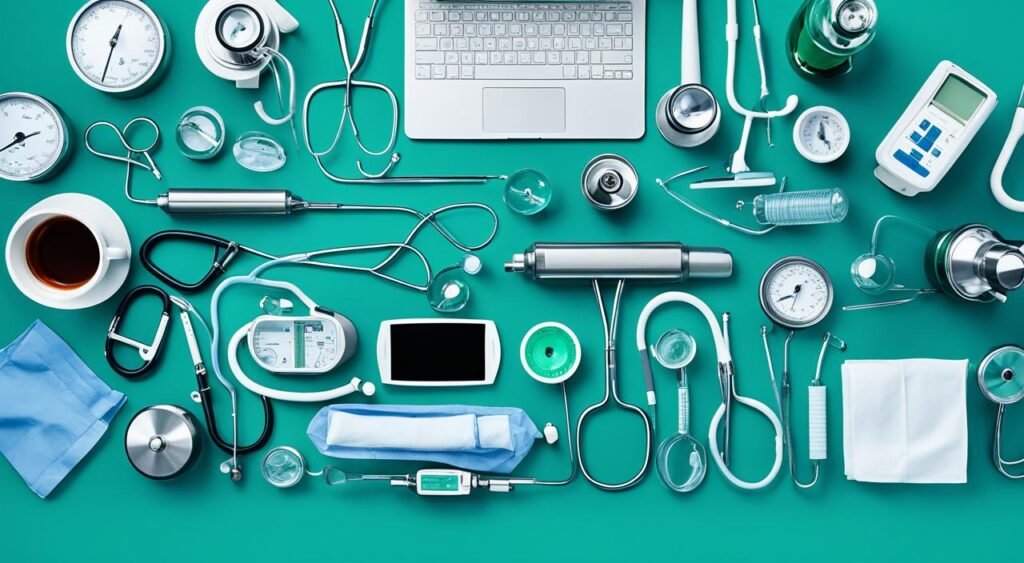
Medical internships often let you try out different medical specialties. This gives you a comprehensive understanding of the many areas in healthcare. You’ll see things like internal medicine, pediatrics, surgery, and emergency medicine. This lets you check out your interests, see how things work in real life, and get a broad view of the medical world.
These rotations help you figure out where you might want to focus your skills and career goals. By trying out a range of activities in various specialties, you can make better choices about what medical specialties you might want to go deeper into.
Getting to see so many medical specialties during your internship is really valuable. It helps you understand the different areas of medicine and what they offer. This experience is key to making smart choices about your future in the changing healthcare field.
“Rotating through different medical specialties during my internship was a game-changer. It allowed me to explore my interests and discover the perfect fit for my skills and passions.”
Performing EKGs and Other Diagnostic Tests
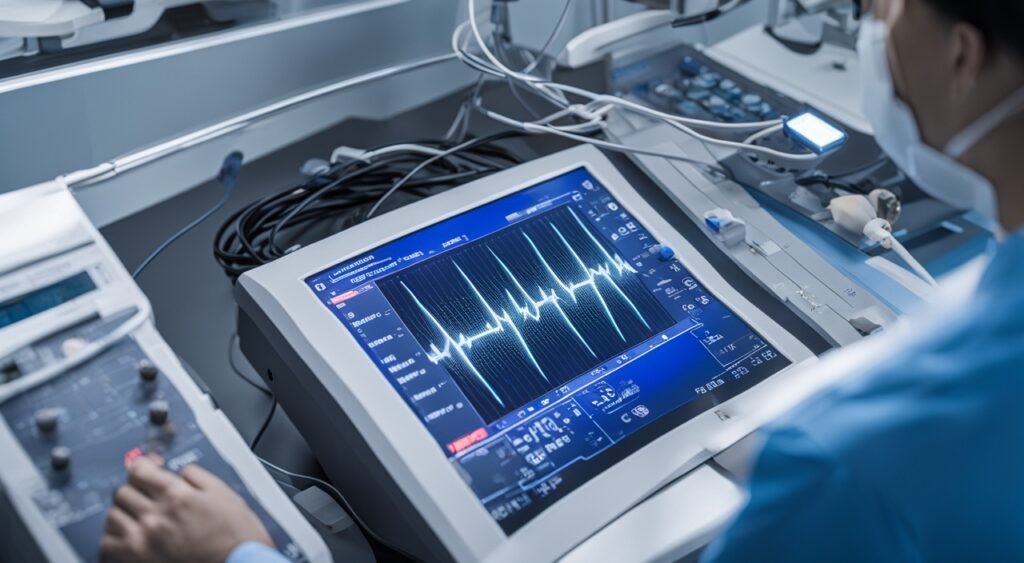
Medical internships give interns a chance to learn by doing. They get to do tests like EKGs, measure blood pressure, and draw blood. They learn how to prepare patients, use the equipment, and understand the test results.
Mastering EKG Procedures
EKGs help doctors check the heart’s electrical activity. Interns learn how to do EKGs well during their internships. They know how to place electrodes, position patients, and use the equipment right. This makes sure the tests are accurate and helpful.
Measuring Blood Pressure and Conducting Blood Draws
Interns also practice taking blood pressure and doing blood draws. They learn the best way to put on the cuff and read the pressure. They also make sure patients are comfortable and safe during these tests. This skill is key for caring for patients and helping with diagnoses.
Understanding the test results is just as crucial. Interns work with doctors to see what the results mean and how they help make treatment choices. This helps them think critically and understand patient care better.
| Diagnostic Test | Interns’ Tasks |
|---|---|
| Electrocardiogram (EKG) |
|
| Blood Pressure Measurement |
|
| Blood Draws |
|
Doing these tests gives interns a deep understanding of how doctors make decisions. This knowledge is very useful as they move forward in their careers. It helps them give great care to patients and make accurate diagnoses.
Also Read : The Power of Regenerative Medicine: Transforming Healthcare
Exploring Internal Medicine
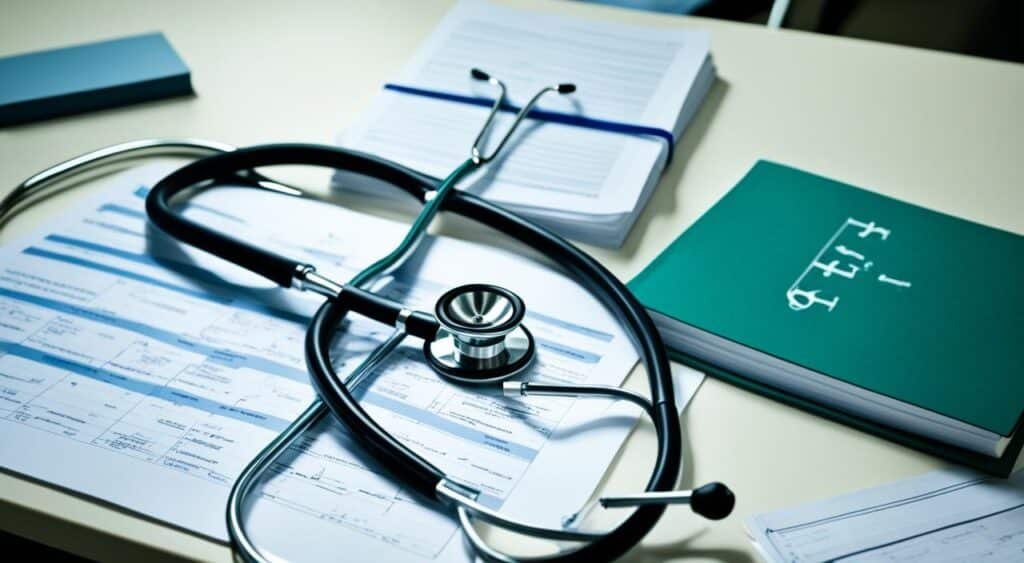
Internships in internal medicine are a great chance for future healthcare pros to dive into this vital medical area. They help interns learn how to diagnose and treat many health issues. They work with skilled doctors in internal medicine.
These internships let interns watch and learn from doctors in areas like rheumatology and cardiology. This way, they get to see how these fields work up close. They understand the important role of internists in giving top-notch care to adults.
Interns also get to move around different parts of internal medicine. This helps them see the whole picture of the field. They get to check on patients every day and work with teams. This sharpens their skills in diagnosis and treatment. It also makes them better at talking and thinking critically.
| Internal Medicine Internship Opportunities | Key Benefits |
|---|---|
| Assisting in diagnosis and treatment of medical conditions | Gain hands-on experience in patient care |
| Shadowing physicians in specialties like rheumatology and cardiology | Develop a deep understanding of internal medicine |
| Rotating through various internal medicine services | Improve diagnostic and treatment skills |
“Internships in internal medicine provide a valuable opportunity for aspiring healthcare professionals to gain hands-on experience in the diagnosis and treatment of a wide range of medical conditions.”
Developing Presentation Skills
Medical internships are great for learning how to make presentations. Interns often have to make educational talks for patients, doctors, and other healthcare workers. They might talk about many things, like sharing new research or teaching others.
To make these talks, interns use tools like PowerPoint to make slides that grab attention. Learning to communicate well and speak in public is key for medical interns. It helps them share complex ideas, teach others, and keep the healthcare community informed.
When making and giving these presentations, interns get better at planning their thoughts and making clear messages. They learn to speak confidently to different groups of people. This skill is very important for doctors. They need to talk well with patients, other doctors, and the whole healthcare team.
FAQs
Q: What are the key skills I can gain from a medical internship?
A: When participating in a medical internship, you can expect to develop skills such as critical thinking, communication, teamwork, professionalism, and clinical knowledge. These skills are essential for a successful career in the medical field.
Q: What is the importance of undertaking a medical internship program?
A: A medical internship program offers invaluable hands-on experience in a real clinical setting. This allows participants to apply theoretical knowledge, enhance practical skills, and gain insight into the daily responsibilities of medical professionals.
Q: How can a medical internship benefit undergraduate students?
A: Medical internships provide undergraduate students with the opportunity to explore different specialties within the medical field, network with professionals, and solidify their career goals. It can also enhance their medical school applications and give them a competitive edge.
Q: Is there a specific timeline for medical internships in 2024?
A: The timeline for medical internships in 2024 may vary depending on the program and institution. It is advisable to research specific internship opportunities and their application deadlines well in advance to plan accordingly.
Q: What role do mentors play in a medical internship?
A: Mentors in a medical internship provide guidance, support, and valuable feedback to participants. They help students navigate their learning experiences, set goals, and develop professionally within the medical field.
Q: Can high school juniors participate in summer medical internship programs?
A: Yes, many institutions offer summer programs specifically designed for high school juniors interested in pursuing a career in medicine. These programs provide exposure to various aspects of the medical field and hands-on learning opportunities.
Q: What can medical interns expect to learn during an emergency medicine rotation?
A: During an emergency medicine rotation, medical interns can expect to learn how to handle urgent medical situations, triage patients, perform procedures under supervision, and work effectively in a fast-paced environment. It is a valuable experience for those interested in this specialty.




